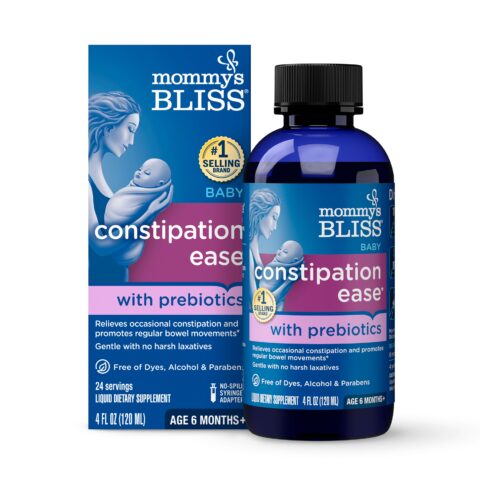Contents
- Recognizing Baby Constipation: Key Indicators
- What is Considered Normal?
- Signs to Look For
- When is it Not Constipation?
- Common Causes of Infant Constipation
- Dietary Factors
- Dehydration
- Underlying Medical Conditions
- Medication Side Effects
- Gentle Home Remedies to Ease Baby Constipation
- Dietary Adjustments for Formula-Fed Babies
- Dietary Adjustments for Breastfed Babies
- Introducing Solids: High-Fiber Options
- Increasing Fluid Intake
- Physical Activity and Massage
- Warm Baths
- When to Seek Medical Attention for Baby Constipation
- Persistent Symptoms
- Blood in Stool
- Severe Pain or Fever
- Lack of Weight Gain
- Infant Under 4 Months
- Preventative Measures for Healthy Infant Digestion
- Consistent Hydration
- Balanced Introduction of Solids
- Regular Physical Activity
- Monitoring Bowel Movements
- Myths and Facts About Baby Constipation
- Debunking Common Misconceptions
Witnessing your little one struggle with discomfort can be distressing, especially when it involves their digestive health. If my baby is constipated, what should I do is a common question among new parents, reflecting a natural concern for their infant’s well-being. Understanding infant constipation involves recognizing the signs and applying gentle interventions to restore digestive comfort. This comprehensive guide, informed by pediatric advice, offers practical home remedies and essential insights to help parents navigate this common childhood issue effectively and safely.
Recognizing Baby Constipation: Key Indicators
Identifying constipation in babies requires observing changes in their bowel habits and stool consistency, as “normal” varies widely. Typically, a breastfed baby might have several bowel movements a day or only one every few days, both considered normal if the stool is soft. For formula-fed babies, daily bowel movements are more common.
What is Considered Normal?
Normal baby stools should be soft and easy to pass. Their frequency can vary significantly based on diet and age. Breastfed infants often have soft, seedy, yellowish stools, while formula-fed babies typically produce slightly firmer, tan-colored stools.
Signs to Look For
Constipation in babies is less about the frequency and more about the difficulty and consistency. Key signs include fewer bowel movements than usual, hard, dry, pellet-like stools, and straining or pain during defecation. Your baby might also seem irritable, have a reduced appetite, or exhibit a firm tummy.
When is it Not Constipation?
It’s crucial to differentiate between true constipation and straining. Babies often strain because their abdominal muscles are weak, or they haven’t learned to coordinate muscle groups for defecation. If the stool is soft once passed, it’s likely not constipation. A 2024 review in Pediatric Research highlighted that parental perception of straining often exceeds actual constipation cases.
Common Causes of Infant Constipation
Understanding the root causes of baby constipation is essential for effective treatment. Several factors can contribute to an infant’s digestive slowdown.
Dietary Factors
Changes in diet are among the most common culprits. Introducing formula after breastfeeding can sometimes lead to constipation, as formula is harder to digest. Similarly, the transition to solid foods, especially if high-fiber options are not prioritized, often results in temporary constipation.
Baby constipation diet changes and food introduction
Dehydration
Insufficient fluid intake is a significant contributor to hard stools. Babies need adequate hydration for their digestive system to function optimally. This is particularly relevant during hot weather or when an infant is unwell.
Underlying Medical Conditions
While less common, certain medical conditions can cause chronic constipation. These might include Hirschsprung’s disease, celiac disease, or an underactive thyroid. If constipation is severe or persistent despite home remedies, medical evaluation is vital.
Medication Side Effects
Some medications, such as certain iron supplements or antihistamines, can cause constipation as a side effect. Always discuss your baby’s current medications with your pediatrician if you suspect they are contributing to digestive issues. According to the American Academy of Pediatrics, medication-induced constipation often requires a targeted approach.
Gentle Home Remedies to Ease Baby Constipation
For most cases of mild baby constipation, several gentle home remedies can provide relief. These methods focus on dietary adjustments, increased fluid intake, and physical stimulation.
Dietary Adjustments for Formula-Fed Babies
For formula-fed infants, sometimes a different formula type can help. Consult your pediatrician before making any changes. Water or juice, sparingly and with caution, might be introduced. For babies over six months, 1-2 ounces of diluted (50/50 with water) prune, pear, or apple juice once or twice a day can soften stools.
Dietary Adjustments for Breastfed Babies
Constipation is rare in exclusively breastfed babies because breast milk is highly digestible. If a breastfed baby appears constipated, the mother’s diet might occasionally play a role. However, it is more often related to the baby’s developing system. A pediatrician should always be consulted if a breastfed baby shows signs of significant constipation.
Introducing Solids: High-Fiber Options
When introducing solids, prioritize fiber-rich fruits and vegetables. “P” fruits—prunes, pears, peaches, and plums—are excellent natural laxatives. Pureed peas, broccoli, and apricots also add beneficial fiber. Avoid excessive amounts of constipating foods like rice cereal, bananas, and cooked carrots initially.
High fiber baby foods for constipation relief
Increasing Fluid Intake
Ensuring your baby receives enough fluids is critical. Breastfed babies typically get sufficient hydration from breast milk. For formula-fed babies, ensure they are receiving adequate formula. If solids have been introduced, offer small amounts of water with meals. A study published in Gastroenterology Today in 2023 noted that increased fluid intake significantly aids in stool softening for infants consuming solids.
Physical Activity and Massage
Gentle physical activity can stimulate bowel movements. Lay your baby on their back and move their legs in a “bicycle legs” motion to help stimulate their intestines. A gentle abdominal massage can also be beneficial. Use your fingertips to gently rub your baby’s tummy in a clockwise direction around the belly button.
Warm Baths
A warm bath can help relax your baby’s abdominal muscles, which may ease discomfort and encourage a bowel movement. The soothing effect of warm water can also provide general comfort for a fussy baby.
When to Seek Medical Attention for Baby Constipation
While most cases of baby constipation resolve with home remedies, there are times when medical advice is necessary. Recognizing these warning signs can prevent potential complications.
Persistent Symptoms
If your baby’s constipation persists for several days despite trying home remedies, or if it becomes a recurring problem, it’s time to consult your pediatrician. Chronic constipation can indicate an underlying issue that requires medical intervention.
Blood in Stool
The presence of blood in your baby’s stool, even just streaks, is a serious sign that warrants immediate medical attention. This could indicate a small tear (anal fissure) from straining or a more significant digestive problem.
Severe Pain or Fever
If your baby experiences severe abdominal pain, excessive fussiness, or develops a fever in conjunction with constipation, seek medical help promptly. These symptoms could point to an infection or other acute condition. According to UNICEF guidelines, fever in infants requires careful medical evaluation.
Lack of Weight Gain
Constipation that interferes with your baby’s feeding and leads to poor weight gain is a serious concern. A pediatrician can assess whether digestive issues are impacting their overall growth and development.
Infant Under 4 Months
For infants under four months of age, any significant change in bowel habits, especially hard stools, should be discussed with a doctor. Their digestive systems are still very immature, and constipation in this age group might require specific medical guidance.
Preventative Measures for Healthy Infant Digestion
Proactive steps can often prevent baby constipation from becoming a recurring issue. Establishing healthy habits early supports optimal digestive function.
Consistent Hydration
Ensuring your baby stays well-hydrated is paramount. Offer breast milk or formula on demand, and once solids are introduced, provide small sips of water throughout the day. This helps keep stools soft and easy to pass. The World Health Organization (WHO) emphasizes the importance of adequate fluid intake for infant health.
Balanced Introduction of Solids
When starting solids, introduce a variety of fiber-rich fruits, vegetables, and whole grains gradually. Monitor your baby’s reaction to new foods and balance potentially constipating foods with those known to aid digestion. This approach minimizes the digestive shock often experienced during the transition.
Regular Physical Activity
Encourage daily tummy time and playful movements that promote physical activity. “Bicycle legs” and gentle stretches can stimulate intestinal movement, aiding in regular bowel movements. A 2024 report from the Journal of Pediatric Gastroenterology highlighted the positive correlation between infant physical activity and reduced constipation incidence.
Monitoring Bowel Movements
Keep a mental note of your baby’s typical bowel patterns, including frequency and consistency. This awareness allows you to quickly identify any deviations that might signal the onset of constipation and address them early. Early intervention is key to preventing severe discomfort.
Myths and Facts About Baby Constipation
Numerous misconceptions surround baby constipation, which can lead to unnecessary worry or incorrect interventions. Understanding the truth is vital.
Debunking Common Misconceptions
One common myth is that dark green or black stools indicate constipation; these colors are often normal, especially after iron supplementation. Another myth is that changing formula brands frequently is helpful; often, it can exacerbate the issue. It’s also a myth that exclusively breastfed babies never get constipated. While rare, it can happen, and medical advice should be sought. The expert pediatricians at LetsWatchBabyTV.online consistently emphasize evidence-based care.
Understanding and addressing baby constipation effectively means combining careful observation with gentle, informed interventions. If my baby is constipated, what should I do is a question best answered with patience and a clear understanding of your baby’s unique needs. Prioritizing hydration, a balanced diet upon introduction of solids, and gentle physical stimulation often provides significant relief. Always remember to consult your pediatrician if symptoms persist or worsen, ensuring your little one receives the best possible care for their delicate digestive system.




